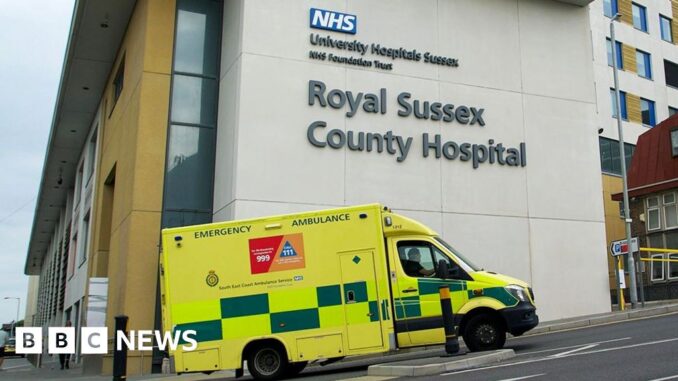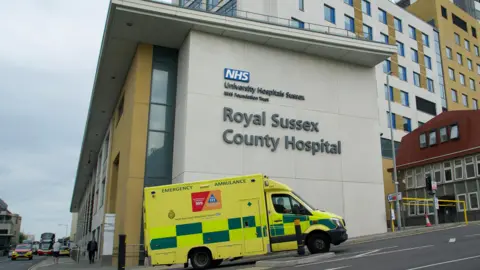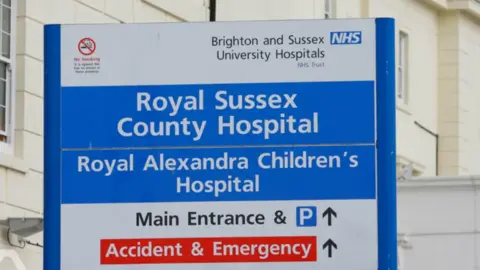
 BBC / Mark Norman
BBC / Mark NormanA surgeon at a crisis-hit NHS trust used a Swiss Army penknife to open up the chest of a patient because he claimed he could not find a sterile scalpel.
University Hospitals Sussex has said the operation was an emergency, but the surgeon’s actions were “outside normal procedures and should not have been necessary”.
Prof Graeme Poston, an expert witness on clinical negligence and a former consultant surgeon, told the BBC: “It surprises me and appals me. Firstly, a penknife is not sterile. Secondly it is not an operating instrument. And thirdly all the kit [must have been] there.”
Police are separately looking into at least 105 cases of alleged medical negligence at the trust and considering manslaughter charges.
The surgeon in the penknife case, who the BBC is not naming, was operating on a patient at the Royal Sussex Hospital in Brighton when he struggled to find a scalpel.
Instead he used a Swiss Army knife which he normally used to cut fruit for his lunch.
The patient survived but internal documents show the surgeon’s colleagues felt his behaviour was “questionable” and were “very surprised” he was unable to find a scalpel.
The BBC has also discovered the same surgeon carried out three supposedly low-risk operations in two months where all three patients died soon after.
The BBC has previously reported that:
- Four whistleblowers said patients had died unnecessarily and been “effectively maimed” at the trust
- A former surgeon claimed a “gang culture” existed in the neurosurgery department. The same doctor alleged one surgeon had disproportionate deaths and a second did complex operations without adequate training
- An internal review conceded doctors could have saved the life of student Melissa Zoglie had they acted sooner
- Sussex Police has recruited extra staff as part of its manslaughter probe concerning the trust
- A Royal College of Surgeons review found a “culture of fear” at the trust and suggested senior managers may need to be replaced
- The trust lost a nine-month legal battle with the BBC and The Times to block access to and redact documents in two employment tribunal cases
The trust launched a series of internal investigations into the three patients who died – and concluded that they had experienced “poor care”.
It also conceded one woman who died “would have survived if there were no post-operative complications”.
The woman’s daughter, who asked not to be identified, said: “We didn’t understand how mum died. No one seemed to know why the operation was not successful.
“There needs to be a thorough investigation into these deaths, not just an action plan. That’s not enough.”
 PA Media
PA Media‘Training problems’
Health watchdog the Care Quality Commission looked at the deaths and concluded there had been no breach of regulations.
University Hospitals Sussex said: “Our investigations did not raise concerns about the surgeries themselves but did identify common themes for improvement, which we acted on immediately to ensure our services are as safe as possible.
“These included better communication with patients before and after surgery, improved training for end-of-life care, and strengthened processes especially when care is transferred from one site to another.”
Prof Poston said these operations usually had a 1% chance of ending in death.
After reviewing the surgeon’s employment record, which included a long wait to become a consultant, Prof Poston said: “I do not know this individual, but you would be concerned that there were problems during the course of that training and progression through training.”
‘Thorough process’
Shortly before the deaths, the operations had temporarily been moved to Worthing Hospital from a bigger site in nearby Brighton against some clinical advice.
Trust chief executive George Findlay was told by colleagues they had safety concerns about moving the location of the operations. The trust’s position did not change.
University Hospitals Sussex said the decision to move the surgeries had included “a thorough process… with oversight from the executive team”.
In response to the wider police investigation of the trust, a Department of Health and Social Care spokesperson said: “We are aware of concerning reports currently under investigation by Sussex Police and our thoughts are with those who have lost loved ones.
“It is vital police officers are given the space and support to properly investigate these matters.
“Sussex Police has confirmed University Hospitals Sussex NHS Foundation Trust is cooperating fully with this investigation.”
‘Sincere sympathies’
Dr Findlay said: “I want to reassure all of our patients and staff that in each of the cases outlined in this report, thorough investigations took place, and action was taken whenever necessary to ensure lessons were learnt.
“We were in touch with these families to express our sincere sympathies for their loss.
“If we ever fall short of the standards people have a right to expect, then we are open, honest, and move swiftly to make improvements.”
He said the trust faced a number of long-standing challenges, and its teams were working hard to address them.
“I am proud of the progress they have made and they will be supported to make the further improvements we know are necessary,” he added.



Be the first to comment